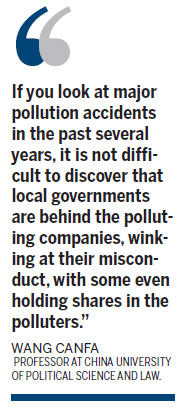|
|||||||||||
BEIJING - Local governments at all levels are expected to face stronger obligations to protect the environment, and polluters will face much heavier fines, according to a draft proposal to amend China's decades-old Environmental Protection Law.
The environmental and resources protection committee of the National People's Congress (NPC) is currently soliciting advice on the draft proposal, which is expected to be reviewed by the standing committee of the NPC as early as December, said Bie Tao, a senior official from the Ministry of Environmental Protection.
|
 |
One highlight of the draft is a proposal to strengthen local governments' legal responsibilities in environmental protection, Bie, deputy director of the policy, law and regulation department, said on Sunday.
"Although local officials are obliged to meet targets on energy conservation and emission reduction, the legal obligations for local governments are still rather ambiguous," he said.
Environmental experts say some local governments, in their blind pursuit of economic growth, have become the true culprits of the country's rampant pollution problems.
"If you look at major pollution accidents in the past several years, it is not difficult to discover that local governments are behind the polluting companies, winking at their misconduct, with some even holding shares in the polluters," said Wang Canfa, a professor at China University of Political Science and Law.
Meanwhile, polluters who refuse to stop dumping industrial waste will face daily penalties while their polluting activities continue, according to the draft proposal.
Such a mechanism has proved effective in Western countries as it can result in huge fines. Previously, low maximum fines in China encouraged some enterprises to violate environmental laws.
Last year, the country's leading gold producer, Zijin Mining Group, was fined 9.56 million yuan ($1.5 million) after a toxic leak killed a large number of fish and caused direct economic losses of 31.9 million yuan. It was the biggest penalty ever imposed on a polluting company in China.
The draft proposal also pushes for greater transparency on pollution information from both government and enterprises.
Public interest litigation, which allows individuals, NGOs and government bodies to sue polluters on behalf of the public, will for the first time be endorsed by law if the draft proposal is approved by the legislature.
Currently, courts rarely accept lawsuits launched against polluting companies by environmental groups on behalf of victims due to legal restrictions.
First published in 1989, many provisions of the existing Environmental Protection Law no longer adequately address the country's enormous pollution problems created during its rapid industrialization and urbanization, Bie said.
The revision aims to improve existing mechanisms, such as reviewing the environmental impact for development projects, and to include new administrative and market-oriented policies to prevent pollution, he said.
"But due to institutional restrictions, the scale of revision is still limited," said Bie, without further elaborating.
- Killers of 13 abducted Chinese sailors identified
- Two US economists win Nobel prize
- Affordable housing near for China
- Mass migration, major problems
- 13 Chinese sailors killed on Mekong
- Attack in Mekong kills 11 Chinese
- China celebrates centenary of 1911 Revolution
- Stricter rules over banking products
Hot Topics
Libya conflict, Gaddafi, Oil spill, Palace Museum scandal, Inflation, Japan's new PM, Trapped miners, Mooncake tax, Weekly photos, Hurricane Irene
Editor's Picks

|

|

|

|

|

|







